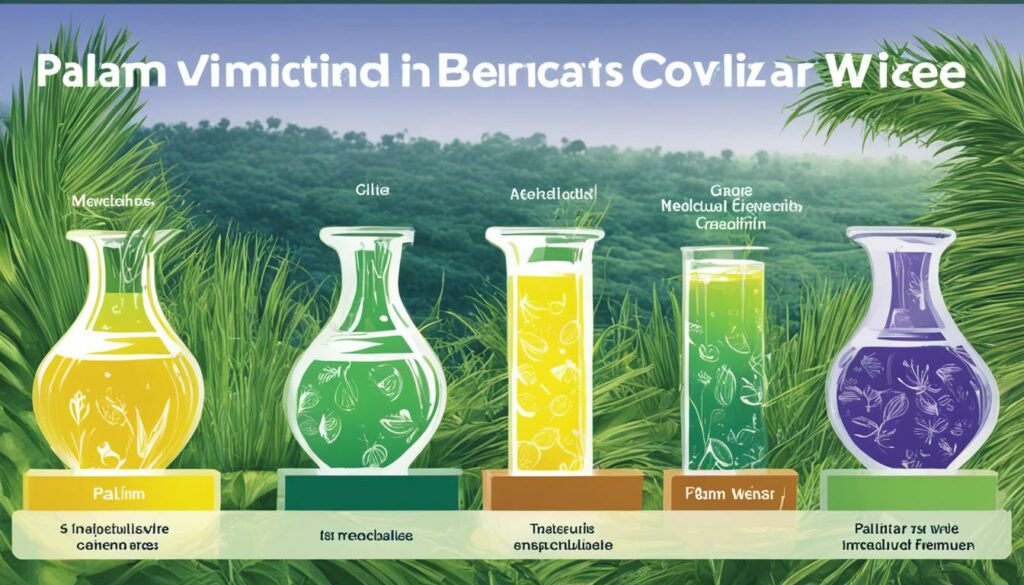Palm wine is a traditional fermented beverage made from the sap of various palm trees. It is enjoyed in tropical regions of Asia, Africa, and South America. Palm wine offers a wide range of health benefits due to its nutrient-rich composition. It contains essential vitamins like B1, B2, B3, and B6, as well as amino acids, sugars, organic acids, and minerals.
Studies have shown that palm wine can boost the immune system, aid in digestion, lower cholesterol levels, promote liver health, relieve stress, enhance libido, prevent anemia, aid in weight loss, improve bone health, regulate blood sugar, and possess anti-inflammatory properties. Additionally, palm wine is rich in antioxidants, which help protect against free radicals and promote overall health and wellness. Current research continues to explore the potential health benefits of palm wine, making it an intriguing beverage to consider for its positive effects on health.
Key Takeaways:
- Palm wine is a traditional fermented beverage made from the sap of various palm trees.
- It contains essential vitamins, amino acids, sugars, organic acids, and minerals.
- Palm wine can boost the immune system, aid in digestion, lower cholesterol levels, promote liver health, relieve stress, enhance libido, prevent anemia, aid in weight loss, improve bone health, regulate blood sugar, and possess anti-inflammatory properties.
- Palm wine is rich in antioxidants, which help protect against free radicals and promote overall health and wellness.
- Current research continues to explore the potential health benefits of palm wine.
Traditional Production of Palm Wine in Various Countries
Palm wine, a beloved traditional beverage, is produced in various countries using different palm species. In Nigeria, renowned for its palm wine culture, this drink is tapped from palm trees such as Elaeis guineensis, Raphia vinifera, and Raphia hookeri. The production process involves tapping the sap, which then undergoes spontaneous fermentation due to the proliferation of yeast species.
One of the significant factors influencing the quality of palm wine is the type of palm tree used and the tapping method employed. Common methods include inflorescence tapping or felling the tree before tapping. The specific palm tree species and the fermentation process contribute to the unique flavors and characteristics of palm wine from different regions.
Palm wine production is deeply rooted in tradition, and traditional packaging materials play an important role in its distribution. Dried gourds or calabash are commonly used to package and transport palm wine, adding to the cultural significance of this ancient beverage. However, it’s worth considering the carbon footprint and sustainability of palm wine packaging to ensure a more eco-friendly future for this cherished drink.
Comparison of Palm Wine Production Methods
| Palm Species | Production Process | Distinctive Features |
|---|---|---|
| Elaeis guineensis | Inflorescence tapping | Delicate flavor with floral notes |
| Raphia vinifera | Felling before tapping | Strong and vibrant flavor profile |
| Raphia hookeri | Inflorescence tapping | Subtle and earthy taste |
“The diverse methods used to produce palm wine result in distinct flavor profiles, offering a delightful experience for enthusiasts seeking a taste of traditional craftsmanship.” – Palm Wine Enthusiast
Nutritional Profile of Palm Wine
Palm wine, a traditional fermented beverage, boasts a significant nutritional profile that contributes to its health benefits. It contains a variety of essential nutrients, including sugars, proteins, fats, and mineral matter, making it a well-rounded beverage.
The sap of palm wine is particularly rich in vitamins and minerals that are vital for overall health. It is a good source of vitamins B1, B2, B3, and B6, which play important roles in energy production, metabolism, and brain function.
Furthermore, palm wine is packed with amino acids, essential building blocks of proteins. These amino acids are necessary for the body’s growth, repair, and maintenance processes.
Minerals like potassium, zinc, and iron are also found in significant amounts in palm wine. Potassium is crucial for maintaining proper heart and muscle function, while zinc and iron are essential for various bodily functions, including immune support and red blood cell production.
The fermentation process of palm wine also results in the production of several biochemical components that contribute to its health properties. These include sugars, organic acids, ethanol, polyphenols, and short-chain fatty acids.
Palm wine’s fermentation process by microbes leads to the conversion of sugars into lactic acid, acetic acid, and ethanol. This results in a slight decrease in pH, giving palm wine a tangy and refreshing taste. The presence of organic acids contributes to the overall flavor profile of palm wine.
The phenolic compounds and bioactive peptides formed during fermentation also add to the health benefits of palm wine. Phenolic compounds are known for their antioxidant properties and potential therapeutic effects. Bioactive peptides, on the other hand, have been shown to have various bioactive properties, such as anti-inflammatory and anti-hypertensive effects.
To provide an overview of the nutritional components in palm wine, here is a table detailing its key vitals:
| Nutrient | Amount per 100ml |
|---|---|
| Vitamin B1 (Thiamine) | 0.02mg |
| Vitamin B2 (Riboflavin) | 0.03mg |
| Vitamin B3 (Niacin) | 0.2mg |
| Vitamin B6 (Pyridoxine) | 0.02mg |
| Amino Acids | Varies based on the fermentation process |
| Potassium | 100mg |
| Zinc | 0.2mg |
| Iron | 0.4mg |
| Polyphenols | Varies based on the fermentation process |
| Short-Chain Fatty Acids | Varies based on the fermentation process |
As you can see, palm wine offers a diverse range of nutrients and biochemical components that contribute to its nutritional value and potential health benefits. Incorporating palm wine into a balanced diet can be a flavorful way to enhance your nutrient intake and enjoy its rich health properties.

Health Impacts and Medicinal Properties of Palm Wine
Palm wine has been associated with various health impacts and medicinal properties. Studies have shown that palm wine can have positive effects on heart health, reducing hypertension and improving cardiovascular function.
The calming effects of palm wine can also help relieve stress and anxiety, promoting overall well-being. Additionally, palm wine has been found to promote liver health by aiding in detoxification and reducing inflammation, making it beneficial for individuals seeking to support their liver function.
Palm wine’s iron content contributes to anemia prevention by promoting red blood cell production, and its mineral composition, including calcium, improves bone health and strength.
For those interested in weight loss, palm wine can aid in suppressing appetite and boosting metabolism, potentially supporting weight management goals. Moreover, palm wine’s low glycemic index makes it a suitable choice for individuals looking to regulate their blood sugar levels.
Furthermore, the anti-inflammatory properties of palm wine can help reduce inflammation and pain in the body, providing potential relief for individuals suffering from inflammatory conditions.
Research on palm wine’s health benefits is ongoing, with current studies investigating its effects on various health conditions and potential medicinal properties
As with any alcoholic beverage, moderation is key when consuming palm wine to reap its health benefits responsibly.

Conclusion
In conclusion, palm wine is a beverage that offers numerous health benefits, thanks to its nutrient-rich composition. From enhancing the immune system to supporting digestion, palm wine can have a positive impact on overall well-being. The traditional production methods and unique nutritional profile of palm wine make it an intriguing drink to explore.
Research on palm wine’s potential health benefits continues to expand our understanding of its positive effects on the body. Ongoing studies shed light on its role in improving heart health, relieving stress, and preventing anemia. As more research unfolds, palm wine provides an exciting opportunity to reconsider this traditional beverage as a part of a healthy lifestyle.
It is important to note that moderation is key when consuming palm wine or any alcoholic beverage to fully enjoy its health benefits responsibly. Incorporating palm wine into a balanced diet and lifestyle can contribute to overall well-being. So go ahead and explore the world of palm wine, and experience the health benefits it has to offer.
FAQ
What are the health benefits of palm wine?
Palm wine offers a wide range of health benefits, including boosting the immune system, aiding in digestion, lowering cholesterol levels, promoting liver health, relieving stress, enhancing libido, preventing anemia, aiding in weight loss, improving bone health, regulating blood sugar, possessing anti-inflammatory properties, and providing antioxidants for overall health and wellness.
How is palm wine traditionally produced in various countries?
Palm wine is produced by tapping the sap of different palm tree species in countries like Nigeria, using methods such as inflorescence tapping or felling the tree before tapping. The fermentation process occurs naturally due to the presence of yeast species, and traditional packaging materials like dried gourds or calabash are often used for distribution.
What is the nutritional profile of palm wine?
Palm wine contains essential nutrients such as sugars, proteins, fats, and minerals. It is a good source of vitamins B1, B2, B3, and B6, as well as amino acids, potassium, zinc, and iron. The fermentation process also results in the presence of various biochemical components like sugars, organic acids, ethanol, polyphenols, and short-chain fatty acids in palm wine.
What are the health impacts and medicinal properties of palm wine?
Studies have shown that palm wine can positively impact heart health by reducing hypertension and improving cardiovascular function. It can also promote liver health, aid in stress relief, prevent anemia, aid in weight loss, improve bone health, regulate blood sugar levels, and possess anti-inflammatory properties, contributing to overall well-being.
Is drinking palm wine healthy?
Yes, palm wine can be a healthy beverage when consumed in moderation. It provides various health benefits due to its nutrient-rich composition and traditional production methods. However, like any alcoholic drink, moderation is key to reaping its health benefits responsibly.




